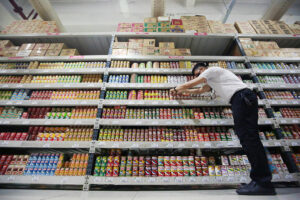
Inflation main downside risk for PHL — WB
INFLATION is expected to be the main downside risk to Philippine economic growth, the World Bank (WB) said on Thursday.
“Inflation is the main downside risk for the Philippines and managing it will require the continued use of nonmonetary measures to complement sound monetary policy,” Ndiamé Diop, World Bank Country Director for Brunei, Malaysia, Philippines and Thailand, said in a forum.
“The nonmonetary measures include the efforts to ensure better supply and demand management and timely and adequate food imports (particularly of staple food items),” he said.
The government must also ensure social assistance to vulnerable sectors where impacts of food inflation are most felt, Mr. Diop added.
He also said that the government’s push to lower tariffs in key commodities like rice would help address sticky inflation.
“For any imported product that is subjected to import tariff, if you reduce the tariff, you tend to reduce the price in the market. So from that perspective, it actually goes in that direction,” Mr. Diop told BusinessWorld after the forum.
Inflation accelerated to a six-month high of 3.9% in May, approaching the upper end of the central bank’s 2-4% target.
Mr. Diop noted that inflation risks remain amid ongoing geopolitical tensions and possible climate shocks.
“In the baseline this year, we see inflation being in the bracket. But then there are risks to that baseline.”
“If you have like a supply shock, let’s say there’s a calamity or a natural disaster that destroys agriculture, that could put some pressure on food prices. If you have energy prices globally suddenly increasing, that could also affect prices,” he added.
Mr. Diop noted the core inflation, which excludes volatile prices of food and fuel, remains well within target.
“The good thing is that the core inflation, which is the most important indicator for the central bank, is really very well-anchored,” he said. “A lot will depend on the tensions in the labor market. If the labor market is very, very hot, that could lead to an increase in core.”
Core inflation eased to 3.1% in May from 3.2% in April and 7.7% in the same month a year earlier, according to data from Philippine Statistics Authority (PSA).
The unemployment rate rose to 4% in April from 3.9% in March, the PSA reported.
The World Bank retained its gross domestic product growth projection for the Philippines at 5.8% in 2024 and 5.9% in 2025 on the expectation of better external conditions and trade, but higher-for-longer interest rates and China’s property crisis continue to be risks. — Beatriz Marie D. Cruz



